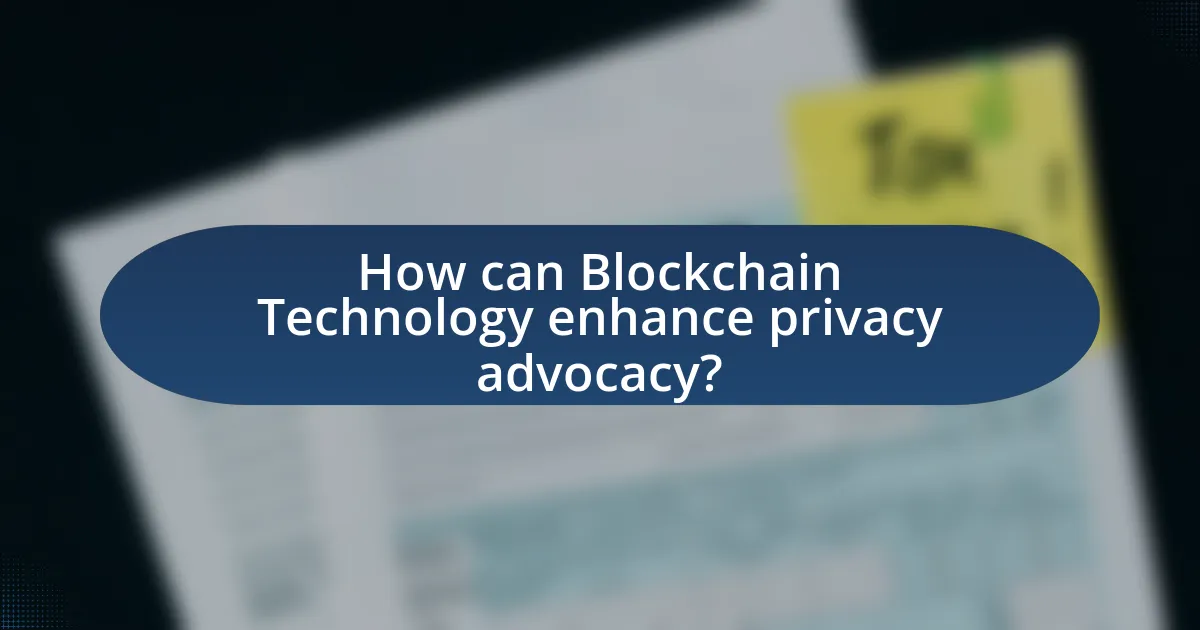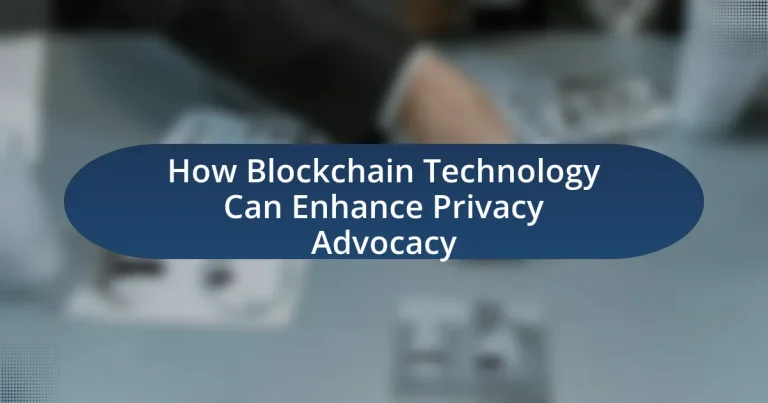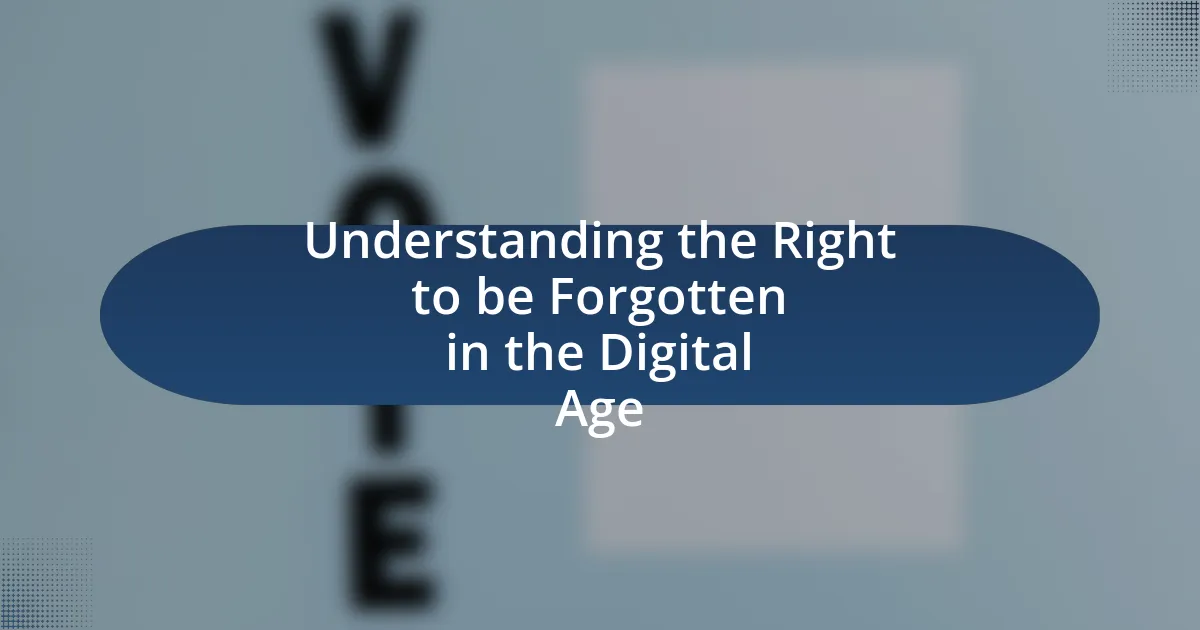Blockchain technology serves as a pivotal tool for enhancing privacy advocacy by enabling decentralized and immutable data storage, which empowers individuals to control their personal information. The article explores the fundamental principles of blockchain, including decentralization, transparency, immutability, and security, and how these principles contribute to improved privacy measures. It addresses the role of encryption in protecting user data, the importance of privacy advocacy in the digital landscape, and the challenges faced by privacy advocates, such as data breaches and surveillance. Additionally, the article discusses how blockchain can address privacy concerns through mechanisms like pseudonymity and smart contracts, while also highlighting potential limitations and best practices for implementation in privacy advocacy efforts.

How can Blockchain Technology enhance privacy advocacy?
Blockchain technology can enhance privacy advocacy by providing decentralized and immutable data storage, which allows individuals to control their personal information. This technology enables users to share data selectively, ensuring that only authorized parties have access to their information, thus reducing the risk of unauthorized data breaches. For instance, in a study by the World Economic Forum, it was highlighted that blockchain can facilitate secure identity management, allowing users to verify their identity without exposing sensitive personal data. This capability supports privacy advocacy by empowering individuals with greater control over their digital identities and personal information.
What are the fundamental principles of Blockchain Technology?
The fundamental principles of Blockchain Technology include decentralization, transparency, immutability, and security. Decentralization ensures that no single entity controls the entire network, allowing for distributed consensus among participants. Transparency allows all transactions to be visible to network participants, fostering trust. Immutability guarantees that once data is recorded on the blockchain, it cannot be altered or deleted, which enhances data integrity. Security is achieved through cryptographic techniques that protect data from unauthorized access and fraud. These principles collectively enable Blockchain Technology to enhance privacy advocacy by providing a secure and transparent framework for data management.
How does decentralization contribute to privacy?
Decentralization contributes to privacy by distributing data across multiple nodes rather than storing it in a central location. This distribution reduces the risk of data breaches, as there is no single point of failure that can be targeted by malicious actors. For instance, in a decentralized network, user information is fragmented and encrypted, making it significantly harder for unauthorized entities to access or exploit personal data. Additionally, decentralized systems often employ cryptographic techniques that enhance user anonymity, further protecting individual privacy.
What role does encryption play in protecting user data?
Encryption plays a critical role in protecting user data by converting it into a format that is unreadable without the appropriate decryption key. This process ensures that even if data is intercepted during transmission or accessed without authorization, it remains secure and confidential. For instance, the use of Advanced Encryption Standard (AES) is widely recognized for its effectiveness in safeguarding sensitive information, as it employs complex algorithms that make unauthorized access virtually impossible. Additionally, encryption helps organizations comply with data protection regulations, such as the General Data Protection Regulation (GDPR), which mandates the protection of personal data through secure methods.
Why is privacy advocacy important in today’s digital landscape?
Privacy advocacy is crucial in today’s digital landscape because it protects individuals’ personal information from misuse and exploitation. With the rise of data breaches, surveillance, and unauthorized data collection, privacy advocacy ensures that individuals have control over their own data. For instance, a 2021 report by the Identity Theft Resource Center revealed that data breaches in the U.S. reached a record high, affecting over 300 million individuals. This highlights the urgent need for privacy protections and advocacy to safeguard personal information and promote transparency in data handling practices.
What are the current challenges faced by privacy advocates?
Privacy advocates currently face challenges such as increasing surveillance, data breaches, and the lack of comprehensive privacy legislation. Surveillance technologies, including facial recognition and mass data collection, undermine individual privacy rights, as evidenced by reports indicating that over 70% of Americans are concerned about government surveillance. Data breaches continue to expose personal information, with the Identity Theft Resource Center reporting over 1,100 data breaches in 2020 alone, affecting millions. Additionally, the absence of unified privacy laws across jurisdictions complicates enforcement and compliance, leaving individuals vulnerable. These challenges hinder the effectiveness of privacy advocacy efforts in protecting personal data and ensuring privacy rights.
How do data breaches impact individual privacy rights?
Data breaches significantly undermine individual privacy rights by exposing personal information to unauthorized access and misuse. When sensitive data, such as social security numbers, financial details, or health records, is compromised, individuals face risks including identity theft, financial fraud, and loss of confidentiality. According to the Identity Theft Resource Center, in 2021, there were over 1,800 reported data breaches in the United States alone, affecting millions of individuals and highlighting the pervasive threat to privacy rights. Such breaches not only violate legal protections, such as the General Data Protection Regulation (GDPR) in Europe, but also erode trust in organizations that fail to safeguard personal data, further diminishing individuals’ control over their own information.
How does Blockchain Technology address privacy concerns?
Blockchain technology addresses privacy concerns by utilizing cryptographic techniques and decentralized architecture to secure user data. Each transaction on a blockchain is encrypted and linked to the previous one, ensuring that sensitive information remains confidential and tamper-proof. Additionally, blockchain allows users to maintain control over their personal data through mechanisms like zero-knowledge proofs, which enable verification of information without revealing the actual data. This approach enhances privacy by minimizing data exposure and reducing the risk of unauthorized access, as evidenced by the implementation of privacy-focused blockchains such as Monero and Zcash, which prioritize user anonymity and data protection.
What mechanisms does Blockchain use to ensure data anonymity?
Blockchain uses several mechanisms to ensure data anonymity, primarily through pseudonymity, cryptographic techniques, and decentralized architecture. Pseudonymity allows users to interact on the blockchain without revealing their real identities, as transactions are linked to cryptographic addresses rather than personal information. Cryptographic techniques, such as hashing and encryption, secure transaction data and user identities, making it difficult to trace back to the original source. Additionally, decentralized architecture prevents any single entity from controlling the data, further enhancing anonymity by distributing information across a network of nodes. These mechanisms collectively contribute to a robust framework for maintaining user privacy in blockchain systems.
How can smart contracts enhance user privacy?
Smart contracts can enhance user privacy by enabling transactions to occur without revealing personal information to third parties. They utilize cryptographic techniques to ensure that only the involved parties can access the details of the transaction, thereby minimizing data exposure. For instance, zero-knowledge proofs allow one party to prove to another that a statement is true without revealing any additional information, effectively safeguarding user identities and transaction specifics. This approach not only protects sensitive data but also complies with privacy regulations, as it limits the amount of personal information shared during transactions.
What are the potential limitations of using Blockchain for privacy advocacy?
The potential limitations of using Blockchain for privacy advocacy include the immutability of data, transparency issues, and scalability challenges. Immutability means that once data is recorded on the blockchain, it cannot be altered or deleted, which can conflict with privacy rights such as the right to be forgotten. Transparency issues arise because, while blockchain transactions can be pseudonymous, they are still visible to all participants, potentially exposing sensitive information. Scalability challenges refer to the limitations in processing large volumes of transactions quickly, which can hinder the practical application of blockchain for privacy-focused solutions. These limitations highlight the complexities of balancing privacy with the inherent characteristics of blockchain technology.
What challenges exist in the implementation of Blockchain solutions?
The challenges in the implementation of Blockchain solutions include scalability, regulatory uncertainty, and interoperability. Scalability issues arise as many blockchain networks struggle to handle a high volume of transactions efficiently; for example, Bitcoin can process only about seven transactions per second, which is significantly lower than traditional payment systems like Visa. Regulatory uncertainty presents a challenge as governments worldwide are still developing frameworks to govern blockchain technology, leading to potential legal risks for businesses. Interoperability challenges occur because different blockchain networks often operate in silos, making it difficult for them to communicate and share data seamlessly. These factors collectively hinder the widespread adoption and effectiveness of blockchain solutions.
How does the scalability of Blockchain affect privacy measures?
The scalability of Blockchain directly impacts privacy measures by influencing the amount of data processed and stored on the network. As Blockchain networks scale, they often prioritize transaction speed and efficiency, which can lead to compromises in privacy features. For instance, increased transaction volume may necessitate the use of simplified or aggregated data, potentially exposing user information to greater scrutiny. Additionally, scalability solutions like sharding or layer-2 protocols can introduce new privacy challenges, as they may require off-chain data handling, which can be less secure than on-chain methods. Research indicates that while scalability enhances usability, it can inadvertently weaken privacy protections if not carefully managed, as seen in the case of Ethereum’s transition to a proof-of-stake model, which raised concerns about data visibility and user anonymity.
How can stakeholders leverage Blockchain for effective privacy advocacy?
Stakeholders can leverage Blockchain for effective privacy advocacy by utilizing its decentralized and immutable nature to enhance data security and user control over personal information. Blockchain technology allows stakeholders to create transparent systems where individuals can manage their own data, ensuring that consent is obtained before any information is shared. For instance, projects like SelfKey and uPort enable users to maintain ownership of their identity and personal data, reducing reliance on centralized entities that often compromise privacy. Furthermore, the use of smart contracts can automate compliance with privacy regulations, ensuring that data handling practices are transparent and verifiable. This approach not only empowers individuals but also builds trust in systems designed for privacy advocacy, as evidenced by the increasing adoption of Blockchain solutions in sectors like healthcare and finance, where data privacy is paramount.
What strategies can organizations adopt to utilize Blockchain technology?
Organizations can adopt several strategies to utilize Blockchain technology effectively. First, they can implement decentralized identity management systems, which enhance user privacy by allowing individuals to control their personal data without relying on centralized authorities. For instance, projects like Sovrin and uPort demonstrate how Blockchain can provide secure and verifiable digital identities, reducing the risk of data breaches.
Second, organizations can leverage smart contracts to automate processes while ensuring transparency and security. Smart contracts execute predefined agreements without intermediaries, which can streamline operations in sectors like finance and supply chain management. For example, Ethereum’s smart contract functionality has been widely adopted for various applications, showcasing its effectiveness in reducing costs and increasing efficiency.
Lastly, organizations can engage in collaborative data sharing through permissioned Blockchains, which allow multiple parties to access and share data securely while maintaining privacy. This approach is particularly beneficial in industries such as healthcare, where sensitive patient information can be shared among authorized entities without compromising confidentiality. The Hyperledger Fabric framework exemplifies this strategy, enabling organizations to create private networks tailored to their specific needs.
How can individuals protect their privacy using Blockchain tools?
Individuals can protect their privacy using Blockchain tools by leveraging decentralized networks that enhance data security and anonymity. Blockchain technology allows users to control their personal information through cryptographic methods, ensuring that data is not stored in a centralized location vulnerable to breaches. For instance, using decentralized identity solutions, individuals can create and manage their digital identities without relying on third-party services, which reduces the risk of data misuse. Additionally, smart contracts can automate transactions while maintaining user privacy, as they execute predefined conditions without revealing personal details. These features are supported by the inherent characteristics of blockchain, such as immutability and transparency, which provide a secure framework for privacy protection.
What best practices should be followed when implementing Blockchain for privacy advocacy?
When implementing Blockchain for privacy advocacy, best practices include ensuring data encryption, utilizing permissioned blockchains, and implementing robust identity management systems. Data encryption protects sensitive information from unauthorized access, while permissioned blockchains limit access to trusted participants, enhancing privacy. Additionally, robust identity management systems, such as decentralized identifiers, help users maintain control over their personal data. These practices are supported by the fact that encryption techniques, like AES-256, are widely recognized for their security, and studies show that permissioned blockchains can significantly reduce data exposure risks.





